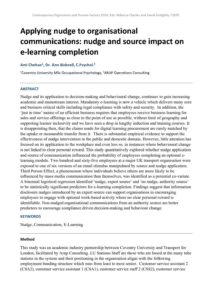| Document | Author Ami Chohan, Dr. Ann Bicknell, C.Psychol. |
| Abstract Nudge and its application to decision-making and behavioural change, continues to gain increasing academic and mainstream interest. Mandatory e-learning is now a vehicle which delivers many core and business critical skills including legal compliance with safety and security. In addition, the ‘just in time’ nature of an efficient business requires that employees receive business learning for sales and service offerings as close to the point of use as possible, without limit of geography and supporting learner inclusivity and we have seen a drop in lengthy induction and training courses. It is disappointing then, that the claims made for digital learning procurement are rarely matched by the uptake or measurable transfer from it. There is substantial empirical evidence to support the effectiveness of nudge intervention in the public and domestic domain. However, little attention has focused on its application to the workplace and even less so, in instances where behavioural change is not linked to clear personal reward. This study quantitatively explored whether nudge application and source of communication influenced the probability of employees completing an optional e-learning module. Two hundred and sixty-five employees at a major UK transport organisation were exposed to one of six versions of an email stimulus manipulated by source and nudge application. Third Person Effect, a phenomenon where individuals believe others are more likely to be influenced by mass media communication than themselves, was identified as a potential co-variate. A binomial logistical regression identified ‘nudge, expert source’ and ‘no nudge, authority source’ to be statistically significant predictors for e-learning completion. Findings suggest that information disclosure nudges introduced by an expert source can support organisations in encouraging employees to engage with optional work-based activity where no clear personal reward is identifiable. Non-nudged organisational communications from an authority source are better predictors to encourage compliance driven decision-making and behaviour change. |

